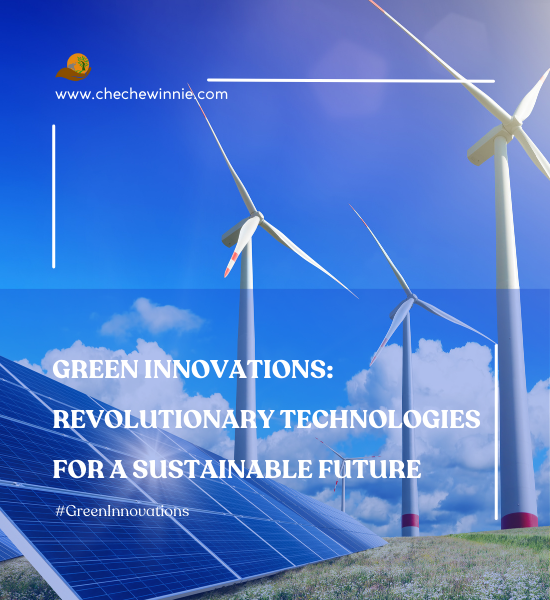In the face of pressing environmental challenges, innovative solutions are crucial for creating a sustainable future.
Green innovations, powered by cutting-edge technologies, are transforming industries and revolutionizing our approach to sustainability.
Renewable Energy Revolution
Renewable energy technologies have made remarkable advancements, providing clean and abundant alternatives to fossil fuels.
Solar power, with its falling costs and increasing efficiency, is now a viable option for generating electricity.
Wind energy has witnessed significant growth, thanks to advancements in turbine technology and offshore installations.
Other renewable sources like geothermal and tidal energy are also gaining momentum.
These innovations are transforming the energy landscape and reducing our reliance on polluting fossil fuels.
Energy Storage Breakthroughs
The integration of renewable energy into the grid requires effective energy storage solutions.
Advances in battery technology, particularly with lithium-ion batteries, have enabled the storage of excess renewable energy for use during periods of high demand or when the sun isn’t shining or the wind isn’t blowing.
Moreover, emerging technologies like flow batteries, hydrogen storage, and compressed air energy storage offer promising alternatives for long-term and large-scale energy storage.
Smart Grid and Energy Management
The development of smart grid technologies is revolutionizing energy distribution and consumption.
Smart grids enable real-time monitoring, optimization, and efficient management of electricity supply and demand. They integrate renewable energy sources, energy storage systems, and advanced metering technologies. This improves grid reliability, reduces energy losses, and empowers consumers to make informed energy choices.
Smart home devices, energy-efficient appliances, and automated demand response systems further contribute to sustainable energy management.
Circular Economy and Waste Management
The concept of a circular economy aims to minimize waste generation and maximize resource efficiency.
Innovations in waste management technologies are transforming the way we handle and repurpose waste. Advanced recycling techniques, such as chemical recycling and biological processes, allow for the extraction of valuable materials from waste streams.
Waste-to-energy technologies, including anaerobic digestion and gasification, convert organic waste into renewable energy sources.
These innovations not only reduce landfill waste but also create new economic opportunities.
Sustainable Transportation Revolution
The transportation sector is undergoing a profound transformation towards sustainability. Electric vehicles powered by rechargeable batteries are becoming increasingly popular, with improved battery range and charging infrastructure.
Furthermore, autonomous driving technologies, ride-sharing platforms, and smart transportation systems optimize energy efficiency and reduce traffic congestion.
Additionally, developments in biofuels, hydrogen fuel cells, and sustainable aviation fuels are paving the way for cleaner and greener transportation options.
Green Building and Sustainable Materials
Innovations in construction and materials are driving the growth of green buildings.
Advanced building designs optimize energy efficiency, incorporate renewable energy systems, and utilize sustainable materials.
Technologies such as smart sensors, energy-efficient lighting, and building automation systems further enhance energy performance and occupant comfort.
Sustainable materials, including recycled and biodegradable materials, reduce the environmental impact of construction and promote resource conservation.
Agriculture and Food Innovations
Sustainable agriculture practices and innovative technologies play a critical role in addressing food security and reducing the environmental impact of the food system.
Vertical farming, hydroponics, and aeroponics enable the year-round cultivation of crops with minimal water usage and land requirements.
Precision agriculture technologies, such as drones and sensors, optimize resource use, minimize chemical inputs, and increase crop productivity.
Plant-based alternatives offer sustainable alternatives to conventional livestock farming.
Water and Resource Management
Water scarcity and resource depletion are significant challenges.
Innovations in water management technologies help conserve and optimize water usage. Smart irrigation systems, moisture sensors, and drip irrigation minimize water wastage in agriculture.
Advanced water filtration and desalination technologies address water scarcity issues.
Additionally, innovative wastewater treatment systems enable the recycling and reuse of water resources.
Conclusion
Green innovations are revolutionizing various sectors, providing us with the tools to create a sustainable future. These technologies, driven by the principles of renewable energy, resource conservation, and waste reduction, hold immense potential for mitigating climate change, promoting environmental stewardship, and fostering economic growth. Embracing these revolutionary technologies and supporting further research and development is crucial for achieving a greener, more sustainable world.
Let us continue to embrace and advocate for these green innovations and build a future that prioritizes both the well-being of our planet and future generations.

